Posts by Christopher Lochhead
274 How To Make Money In A Recession: 5 Steps To Create Demand For Your Product, Service, Or Platform
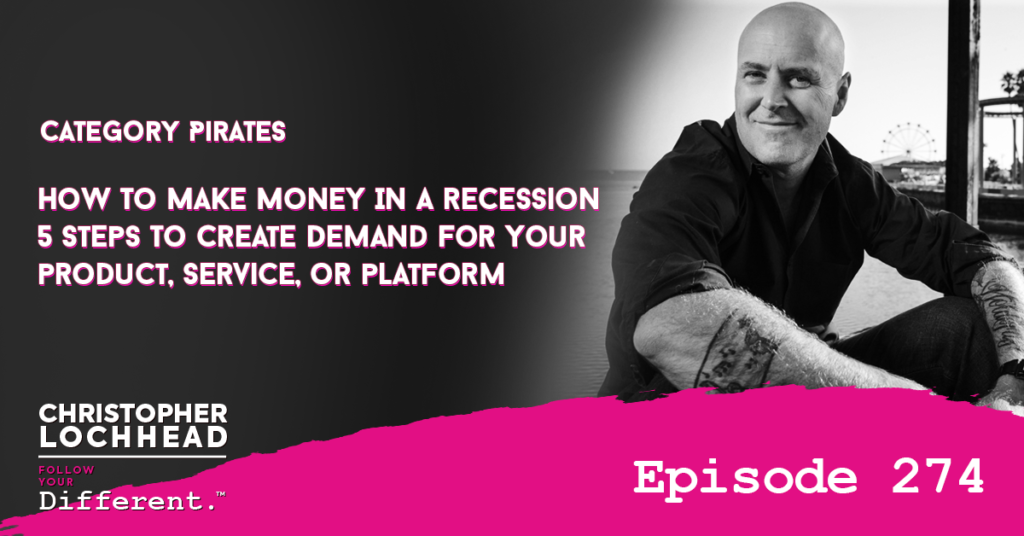
Podcast: Play in new window | Download (Duration: 39:12 — 26.9MB) | Embed
Subscribe: Apple Podcasts | Spotify | Pandora | RSS | More
Welcome to a very special episode of Christopher Lochhead: Follow Your Different, where we talk about how to make money in a recession.
In times that are challenging, one of the greatest things we all can do is contribute what we can contribute. Given that it looks like we’re about to be in a recession, what Eddie Yoon Nicolas Cole, and I aka the Category Pirates decided to do was to write a new mini book newsletter. It’s called How To Make Money In A Recession: Five steps to create demand for your product, service or platform.
We elected to make the written version of this free. There’ll be a link to it at the end of this show notes. So consider this episode, a mini book audio read.
We are in a Recession
Dear Friend, Subscriber, and Category Pirate,
We are in a recession.
(Not officially, but it is not looking good.)
Stocks are down. Startup valuations have plummeted. Bitcoin and Ethereum have lost more than 50% of their total value since their respective highs back in November, 2021. And sentiment around Silicon Valley is that the next 12-18 months are going to be challenging for companies looking to raise money.
But where there is chaos, there is opportunity.
Approximately 10% of companies get stronger in downturns. And you can’t be in the 10% unless you do some serious thinking.
Through the category lens, downturns are simple to understand—and have a clear path to navigate. When times get tough, businesses, governments, households, and individuals all do the same thing: they create two lists.
- “Must Haves”
- “Nice To Haves”
Then they start cutting the “Nice To Haves” to lower costs—as a direct response to their revenue / income / buying power shrinking.
The Question Every Business Should Ask
Which means the seminal question is: what makes people put some categories/brands/products on the “Must Have” list versus the “Nice To Have” list?
Perceived value.
(Everything we value, we’ve been taught to value.)
The difference between a dumb idea and a great one, or the difference between useful products and useless ones is the perception we have based on what we have been taught. (Don’t forget: pet rocks used to be in demand.)
The trick is to get your product/service/platform on the “Must Have” list, and to be as high up on the list as possible. Because the higher the category is on the hierarchy of perceived value in the consumer’s mind, the greater the likelihood they will keep buying from you.
Which is why savvy leaders market the category in downturns.
Because people make their lists by category first, and brand second.
The Net-Positive Effects of Recession
Elon Musk was a guest on the All In podcast and summarized the net-positive effects of recessions well:
“Recessions are not necessarily a bad thing. I’ve been through a few of them. What tends to happen, if you have a boom that goes on for too long, you get misallocation of capital. It starts raining money on fools, basically. Any dumb thing gets money. At some point, it gets out of control… and the bullshit companies go bankrupt and the ones that are building useful products are prosperous.”
When most people hear the word “recession,” they imagine the housing crisis of 2008 or the dot-com bubble in the late 90s—and all of the businesses that went under as a result.
But what doesn’t get talked about enough are the incredible companies that emerged out of these challenging times as well. Google and Amazon both came out of the dot-com bubble in the 90s (as did hundreds of other world-changing companies). And Uber, Spotify, Airbnb, Square, and dozens of other next-gen technology companies were founded between 2006 and 2009, right in the middle of the greatest financial crisis to ever threaten America.
Recessions are pressure-cookers that rid the system of businesses failing to live up to the value they are promising society.
To hear more on how you can make money even during a recession, download and listen to this episode.
Bio
Links
How To Make Money In A Recession
We hope you enjoyed this episode of Christopher Lochhead: Follow Your Different™! Christopher loves hearing from his listeners. Feel free to email him, connect on Facebook, Twitter, Instagram and subscribe on iTunes!
150 How To Make Money In A Recession: 5 Steps To Create Demand For Your Product, Service, Or Platform
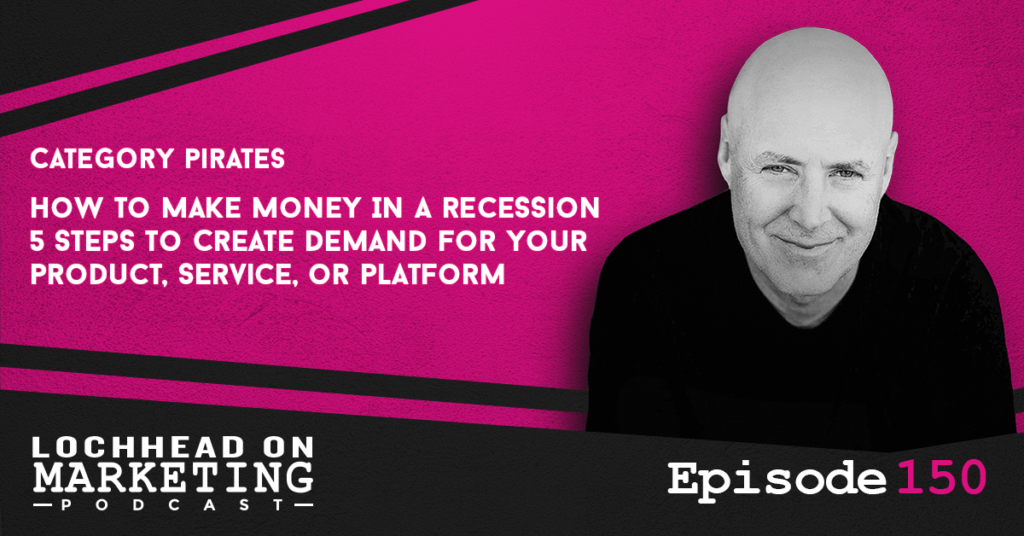
Podcast (lochheadonmarketing): Play in new window | Download (Duration: 39:27 — 27.1MB) | Embed
Subscribe: Apple Podcasts | Spotify | RSS | More
Welcome to a very special episode of Lochhead on Marketing, where we talk about how to make money in a recession.
In times that are challenging, one of the greatest things we all can do is contribute what we can contribute. Given that it looks like we’re about to be in a recession, what Eddie Yoon Nicolas Cole, and I aka the Category Pirates decided to do was to write a new mini book newsletter. It’s called How To Make Money In A Recession: Five steps to create demand for your product, service or platform.
We elected to make the written version of this free. There’ll be a link to it at the end of this show notes. So consider this episode, a mini book audio read.
We are in a Recession
Dear Friend, Subscriber, and Category Pirate,
We are in a recession.
(Not officially, but it is not looking good.)
Stocks are down. Startup valuations have plummeted. Bitcoin and Ethereum have lost more than 50% of their total value since their respective highs back in November, 2021. And sentiment around Silicon Valley is that the next 12-18 months are going to be challenging for companies looking to raise money.
But where there is chaos, there is opportunity.
Approximately 10% of companies get stronger in downturns. And you can’t be in the 10% unless you do some serious thinking.
Through the category lens, downturns are simple to understand—and have a clear path to navigate. When times get tough, businesses, governments, households, and individuals all do the same thing: they create two lists.
- “Must Haves”
- “Nice To Haves”
Then they start cutting the “Nice To Haves” to lower costs—as a direct response to their revenue / income / buying power shrinking.
The Question Every Business Should Ask
Which means the seminal question is: what makes people put some categories/brands/products on the “Must Have” list versus the “Nice To Have” list?
Perceived value.
(Everything we value, we’ve been taught to value.)
The difference between a dumb idea and a great one, or the difference between useful products and useless ones is the perception we have based on what we have been taught. (Don’t forget: pet rocks used to be in demand.)
The trick is to get your product/service/platform on the “Must Have” list, and to be as high up on the list as possible. Because the higher the category is on the hierarchy of perceived value in the consumer’s mind, the greater the likelihood they will keep buying from you.
Which is why savvy leaders market the category in downturns.
Because people make their lists by category first, and brand second.
The Net-Positive Effects of Recession
Elon Musk was a guest on the All In podcast and summarized the net-positive effects of recessions well:
“Recessions are not necessarily a bad thing. I’ve been through a few of them. What tends to happen, if you have a boom that goes on for too long, you get misallocation of capital. It starts raining money on fools, basically. Any dumb thing gets money. At some point, it gets out of control… and the bullshit companies go bankrupt and the ones that are building useful products are prosperous.”
When most people hear the word “recession,” they imagine the housing crisis of 2008 or the dot-com bubble in the late 90s—and all of the businesses that went under as a result.
But what doesn’t get talked about enough are the incredible companies that emerged out of these challenging times as well. Google and Amazon both came out of the dot-com bubble in the 90s (as did hundreds of other world-changing companies). And Uber, Spotify, Airbnb, Square, and dozens of other next-gen technology companies were founded between 2006 and 2009, right in the middle of the greatest financial crisis to ever threaten America.
Recessions are pressure-cookers that rid the system of businesses failing to live up to the value they are promising society.
To hear more on how you can make money even during a recession, download and listen to this episode.
Bio
Links
How To Make Money In A Recession
We hope you enjoyed this episode of Lochhead on Marketing™! Christopher loves hearing from his listeners. Feel free to email him, connect on Facebook, Twitter, Instagram, and subscribe on iTunes!
149 Startup Downturn Marketing Mistake, What To Do About It, & Why People Who Create Demand Are In Massive Demand
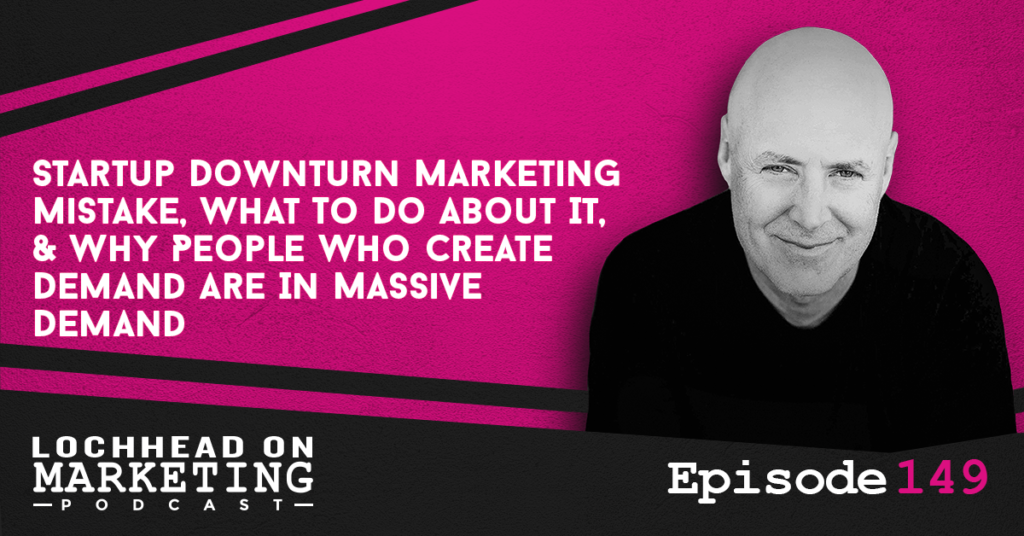
Podcast (lochheadonmarketing): Play in new window | Download (Duration: 18:37 — 12.8MB) | Embed
Subscribe: Apple Podcasts | Spotify | RSS | More
On this episode of Lochhead on Marketing, let’s talk about the big startup downturn marketing mistakes and what to do about it. We also talk about why people who create demand are in massive demand.
Lastly, there is the topic about your career, and what to do when the economy goes sideways, both in your business and in your career.
Welcome to Lochhead on Marketing. The number one charting marketing podcast for marketers, category designers, and entrepreneurs with a different mind.
Startup Downturn Marketing Mistake
The reality is, it’s not just startups who make this mistake.
But before that, let’s go through the top 10 list of what happens when the recession hits.
Number one, the recession hits. The immediate impact of that, of course, is number two, demand falls. So what do most companies do? Number three, they market hard in an effort to catch demand.
Remember, when most people say marketing, what they mean is compete in an existing market category for existing demand. So when they do marketing, what they’re really doing is demand capture.
So when the recession hits to demand falls, three, they market hard to catch, falling demand or some people say catch a falling knife. As a result, number four, customer acquisition costs aka CAC goes up.
Number six to nine is just running around in circles, repeating numbers two to four. Until you reach number ten, where they finally run out of time and money.
Here’s the big learning: He who competes for demand loses, she who creates demand wins. It also happens to be why category design is the most powerful underground skill in business. Most people don’t understand that just like you can create and design a product and accompany you could also create and design a market category.
Recession through a Different Lens
I get into trouble for saying this, but most people immediately assume a negative defensive position in a recession or a downturn. However, approximately 10% of companies get stronger during the recession.
In the last week, I have had many conversations with entrepreneurs and CEOs about how to take advantage of the coming downturn. I know that sounds crazy to a lot of people, but you can’t be in the 10%, that gets stronger, and you can’t be in the elite companies that actually are able to take advantage of a downturn unless you at least ask the questions. So I’m asking you to consider a different way.
Choosing a Different Way
So here’s the different way and specific as it relates to shrinking demand. So there’s three kinds of demand. Number one, as we talked about demand capture. Number two, demand creation. That’s why some people call it category creation.
One of the stupid arguments we hear all the time is, “well, category design is dumb, because why would we go to a market where there’s zero demand, and we have to create it all, when we can just catch demand? Okay? She who creates the demand wins. That’s why.
Now in a downturn, here’s the problem. It can take some time to create demand. People say, “well, we don’t have time our revenues falling, we need to generate revenue now.” This is where the third type of approach, wherein we dam the demand. By doing so, you redirect demand from an existing market to a new solution that your product or services provides.
To hear more about how to deal with Startup Downturn Marketing Mistake, download and listen to this episode.
Bio
Christopher Lochhead is a #1 Apple podcaster and #1 Amazon bestselling co-author of books: Niche Down and Play Bigger.
He has been an advisor to over 50 venture-backed startups; a former three-time Silicon Valley public company CMO and an entrepreneur.
Furthermore, he has been called “one of the best minds in marketing” by The Marketing Journal, a “Human Exclamation Point” by Fast Company, a “quasar” by NBA legend Bill Walton and “off-putting to some” by The Economist.
In addition, he served as a chief marketing officer of software juggernaut Mercury Interactive. Hewlett-Packard acquired the company in 2006, for $4.5 billion.
He also co-founded the marketing consulting firm LOCHHEAD; the founding CMO of Internet consulting firm Scient, and served as head of marketing at the CRM software firm Vantive.
We hope you enjoyed this episode of Lochhead on Marketing™! Christopher loves hearing from his listeners. Feel free to email him, connect on Facebook, Twitter, Instagram, and subscribe on iTunes!
273 A New Way To Think with World’s #1 Management Thinker Roger Martin
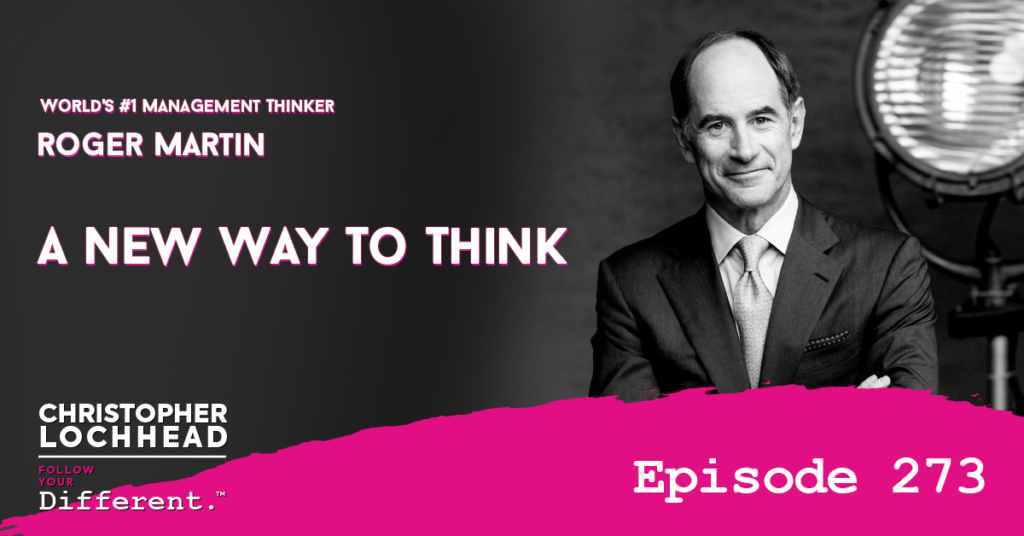
Podcast: Play in new window | Download (Duration: 1:31:35 — 62.9MB) | Embed
Subscribe: Apple Podcasts | Spotify | Pandora | RSS | More
On this episode of Christopher Lochhead: Follow Your Different, we have a radically different dialogue about thinking with the legendary Roger Martin – a man who has been called, “the world’s number one management thinker” by former Ford CEO Jim Hackett.
Roger Martin is a Professor Emeritus at the Rotman School of Management at the University of Toronto, where he served as Dean from 98 to 2013, and as Institutional Director of the Martin Prosperity Interest Institute from 2013 to 2019. In 2013, he was also named Global Dean of the Year.
In this remarkable conversation, we dig into the definition of thinking. We also discuss the difference between what Roger calls reflexive versus reflective thinking, and why thinking is a meta skill. So if you are interested on expanding the way you think, stay and listen to learn more.
Roger Martin on Thinking about Thinking
The conversation starts off on the topic of thinking about thinking, and if it’s weird to do so. Roger offers his thoughts on the matter:
“I don’t think so, no. But you know, I am surprised at the number of people who seem to not think about how they think – they just think. And then when something kind of bad happens, they’re kind of flummoxed. The ones who are more inclined to think about how they’re thinking are more likely to say, “well, maybe I wasn’t thinking about that the best way I could, what would be a different way to think about it?” ” – Roger Martin
The Definition of Thinking
Before heading into deeper topics, we discuss the definition of thinking. Roger gives an explanation of his definition of thinking below:
“I see it as the process of reflecting on your world against a model you have of it. So you’d be thinking, if you say, that person just smiled at me as we walked by each other. So that was stimulus to your senses. And to think about it, you have to have some kind of a model in your head interpreting it. So you would say, when the corners of the lips go up like that, it generally means that that person is kind of happy, or is favorably disposed toward me, and not they have a nervous tic. But that could be another interpretation of it. But you have some kind of model that says, “this is my method of interpreting what is happening to me.” “ – Roger Martin
The thing is, other people might not have the same model as you do, unless you are privy that information. This often results in clashes in models, or a misinterpretation of other people’s model because they are unfamiliar, or radically different from yours.
That is where thinking about thinking plays a role.
Reflexive versus Reflective Thinking
Roger was then presented with a thought about the current way of thinking:
“We live in a world today that what that says that what most people call thinking is actually the mental retweeting of something they heard that they like, that often confirms and existing thought. And that existing thought was something they were taught to think, ergo, what most people call thinking today is actually not thinking.”
Roger’s response is that conceptually, that is correct. But in a way, it is also another type of thinking.
“What you describe is also thinking, but it is a much more reflexive form of thinking, then reflective form of thinking. So it’s sort of a bit of a, like a reflexive pattern recognition. But I don’t object to calling non reflective thinking to be just barely thinking or maybe not thinking at all.” – Roger Martin
To learn more about Roger Martin & the different kinds of thinking, download and listen to this episode.
Bio
Roger L. Martin is Professor Emeritus at the Rotman School of Management at University of Toronto, where he served as Dean from 1998 to 2013, and as Institute Director of the Martin Prosperity Institute from 2013 to 2019.
In 2013, he was named Global Dean of the Year and in 2017, he was named the world’s number one management thinker by Thinkers50.
He has published 12 previous books including When More Is Not Better and Playing to Win (with A. G. Lafley), which won the award for Best Book of 2012-13 by Thinkers50. Martin is a trusted strategy adviser to the CEOs of many global companies. A
Canadian from Wallenstein, Ontario, he holds a BA from Harvard College and an MBA from Harvard Business School.
Links
Connect with Roger Martin!
Website | A New Way to Think | LinkedIn | Twitter
Check out Roger’s books on Amazon!
We hope you enjoyed this episode of Follow Your Different™! Christopher loves hearing from his listeners. Feel free to email him, connect on Facebook, Twitter, Instagram and subscribe on iTunes!
148 Who Are You Going To Be When The Sh*t Hits The Fan
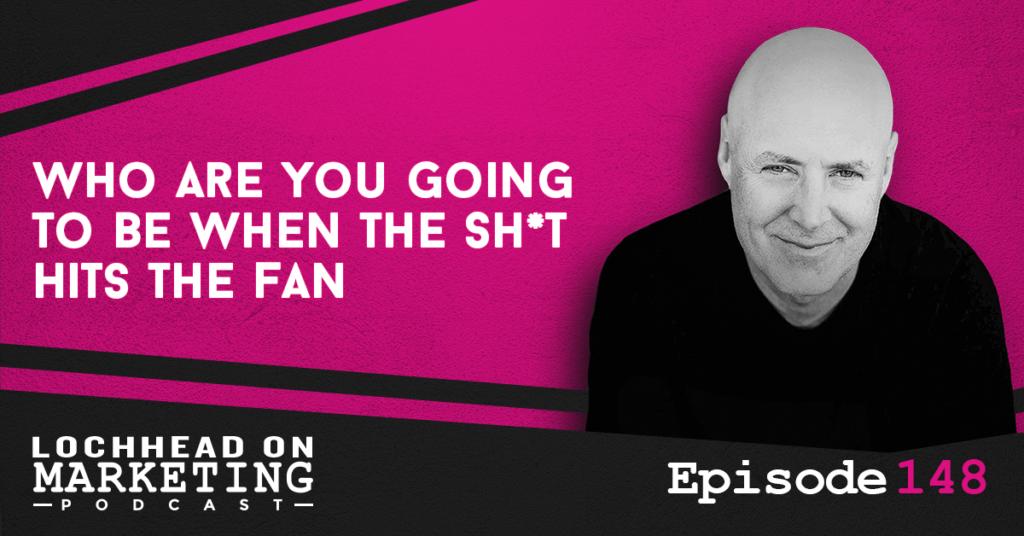
Podcast (lochheadonmarketing): Play in new window | Download (Duration: 35:17 — 24.2MB) | Embed
Subscribe: Apple Podcasts | Spotify | RSS | More
On this episode of Lochhead on Marketing, let’s talk about a critical question: Who are you going to be when the shit hits the fan?
As we have talked about in previous episodes, it is starting to look like the business environment could get very hard here. Some people in Silicon Valley are even saying that it could be like back in 2008. Sequoia Capital wrote their seminal “RIP, Good Times” presentation, and its final slide says, “Get real, or go home”. No matter what’s going to happen next in the economy, or frankly, the world, it’s probably time for all of us to get real or go home.
So let’s dig into why some people step up, and others melt down in times of crisis.
Welcome to Lochhead on Marketing. The number one charting marketing podcast for marketers, category designers, and entrepreneurs with a different mind.
The Signs
When I was in my late 20s, and into my early 30s, I was the founding CMO of a company called Scient. We were a leader in the we called E-business Innovation Space, we were one of the very first consulting firms to focus on building E-businesses or Digital Businesses. We did incredibly well, as a matter of fact, the company was founded, I believe, in 98, maybe late 97. By 2000, we had grown to almost 3000 people, which is incredible for a consulting startup, essentially. We were public and had a market cap of about $9 billion.
Now, if you were around back then, you’ve done your homework, and you know the.com bust happened. Like all bad things, they happen over time. It built starting by about February, March, we could feel things starting to get bad.
Shortly thereafter, we could feel the rumblings our pipeline wasn’t starting to look very good. There was weird shit happening with our customers. And there was a slow takedown that happened from about March, slowly, slowly, slowly, building over the summer, and by the fall, we were in a freefall.
Sh*t Hits the Fan
Due to all that, we had to do the first ever layoff in the history of the company. It was insanely painful.
So when we announced the miss in the projected stocks, we do the layoff. The people we laid off are amazing. They were cheering the company on saying please go forward and be successful sign had an incredible culture. So as painful as it was, the exiting people were, were incredible warriors and supporters. And the people who stayed really wanted to make a go of it.
However, people at management seemed to be focusing on the wrong things, rather than discussing how to move forward, given the resources we still had at the moment. This continued until I left the company, and from there the company continued on its freefall rather than picking itself up and starting anew.
How People React to Disruption
So why do I share that with you? It’s a great example of the shit hitting the fan for a company. In my opinion, an executive team unwilling to deal with the reality of the situation, and unwilling to deal with it with any kind of speed is a bad way to go at it. That’s why I got so mad and took off, and that’s why the CEO of the company fired me. After that, the company vaporized.
To hear more how legendary people react when disruption happens in the market, download and listen to this episode.
Bio
Christopher Lochhead is a #1 Apple podcaster and #1 Amazon bestselling co-author of books: Niche Down and Play Bigger.
He has been an advisor to over 50 venture-backed startups; a former three-time Silicon Valley public company CMO and an entrepreneur.
Furthermore, he has been called “one of the best minds in marketing” by The Marketing Journal, a “Human Exclamation Point” by Fast Company, a “quasar” by NBA legend Bill Walton and “off-putting to some” by The Economist.
In addition, he served as a chief marketing officer of software juggernaut Mercury Interactive. Hewlett-Packard acquired the company in 2006, for $4.5 billion.
He also co-founded the marketing consulting firm LOCHHEAD; the founding CMO of Internet consulting firm Scient, and served as head of marketing at the CRM software firm Vantive.
We hope you enjoyed this episode of Lochhead on Marketing™! Christopher loves hearing from his listeners. Feel free to email him, connect on Facebook, Twitter, Instagram, and subscribe on iTunes!
272 The Culture Playbook with NYT Bestselling Author Daniel Coyle
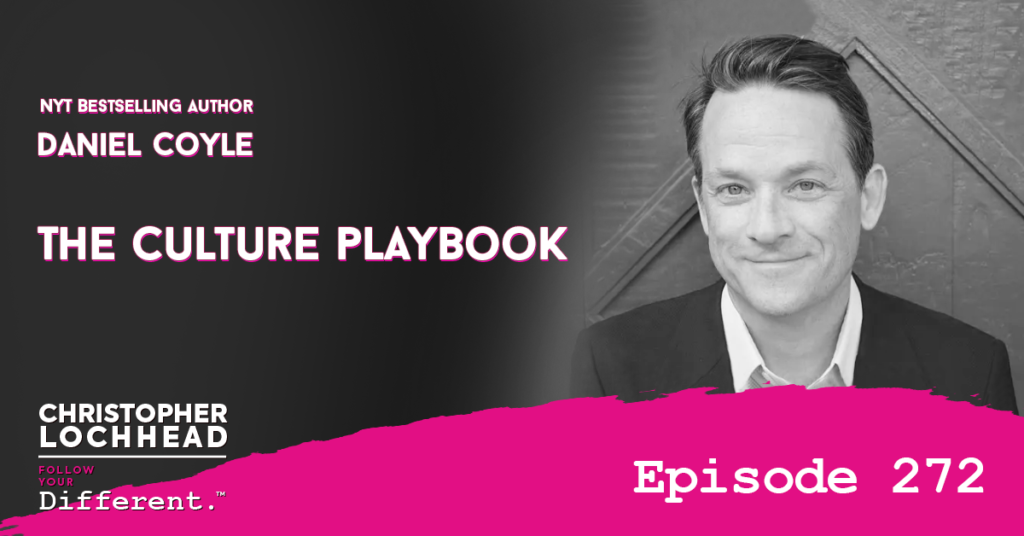
Podcast: Play in new window | Download (Duration: 46:10 — 31.7MB) | Embed
Subscribe: Apple Podcasts | Spotify | Pandora | RSS | More
Many people are asking how do we create legendary cultures in a digital / hybrid work environment. On this episode of Christopher Lochhead: Follow Your Different, we ask Daniel Coyle this question: how can we create legendary cultures?
Daniel Coyle is a New York Times bestselling author. His book, The Culture Code, was named the Best Business Book of the Year a little while back by Bloomberg. He has a new book out now, called The Culture Playbook: 60 highly effective actions to help your group succeed.
He is the man on all things culture, so stay and listen to learn more.
Daniel Coyle on Writing His New Book
The conversation starts of with congratulating Daniel Coyle on publishing his latest book, The Culture Playbook. Daniel follows up on his thoughts on how he feels when launching a new project or book.
“We are living through a moment, aren’t we? It’s like, when you start a project like this, you’re never quite sure when it’s going to land. And everybody’s trying to figure out, “How are we going? How are we going to do this? How are we going to work together now? Everybody’s having that conversation now. It is a moment, and it’s kind of fun to explore what’s possible” – Daniel Coyle
The Transition Period
Daniel was then asked about his thoughts on certain huge companies that are telling their people to go back to the office. Another thing to note was that those who are pushing for these things are usually those who are Native Analogs – people whose life don’t revolve in the digital sphere.
Daniel thinks that this current period is a transitional phase, and it’s a way for companies to see what works and what doesn’t.
“Is it transition and it is totally fascinating to see us people self-organize in this new world. And there’s basically two schools of thought about it. The first school of thought is, this was a rupture. People things will never go back to the way they were, people discovered that they had lives outside of work.
Then there’s another school of thought, which says, Yeah, this is kind of part of a larger, longer journey, there was a sort of zoom out where people realized, hey, life’s a lot bigger than work. But at the same time, that there is kind of a joy and a pleasure and a positivity and a productivity that comes out of being in the office. It’s maybe not five days a week, maybe it’s three, maybe it’s two.” – Daniel Coyle
Daniel admits that he himself falls under the second school of thought, and that going to the office can be quite beneficial for productivity, even if it’s just 2 to 3 days off a week.
Organizing Your Office for the New Work Experience
On the topic of adopting the hybrid workplace, one of the issues brought up was the lack of coordination. For example, one could be scheduled to be at the office, yet the people who they have to work or have a meeting with are staying at home.
Daniel agrees that this is currently happening in a lot of offices, and is something that the teams and management need to address. They have to be intentional and work out schedules where everyone in the team is in the office at the same time, so they can meet and collaborate on what needs to be done for their projects.
Management can also help in coordinating schedules, so that different teams that need to work together can have overlapping schedules.
But at the end of the day, the initiative to coordinate should come from the teams themselves. Otherwise, you’ll be stuck in your cubicle, still doing zoom calls with your teammates.
To hear more from Daniel Coyle and how to create a legendary culture in your workplace, download and listen to this episode.
Bio
Daniel Coyle is the New York Times best-selling author of The Culture Playbook, The Culture Code, The Secret Race, The Little Book of Talent, The Talent Code, Lance Armstrong’s War, Hardball: A Season in the Projects and the novel Waking Samuel.
Winner (with Tyler Hamilton) of the 2012 William Hill Sports Book of the Year Prize, he is a contributing editor for Outside magazine, and also works a special advisor to the Cleveland Indians.
Coyle lives in Cleveland, Ohio during the school year and in Homer, Alaska, during the summer with his wife Jen, and their four children.
Link
Website | The Culture Playbook | Daniel Coyle’s Works
We hope you enjoyed this episode of Follow Your Different™! Christopher loves hearing from his listeners. Feel free to email him, connect on Facebook, Twitter, Instagram and subscribe on iTunes!
147 Why Most Tech Marketing Fails & What To Do About It with Chris Walker & Megan Bowen of Refine Labs
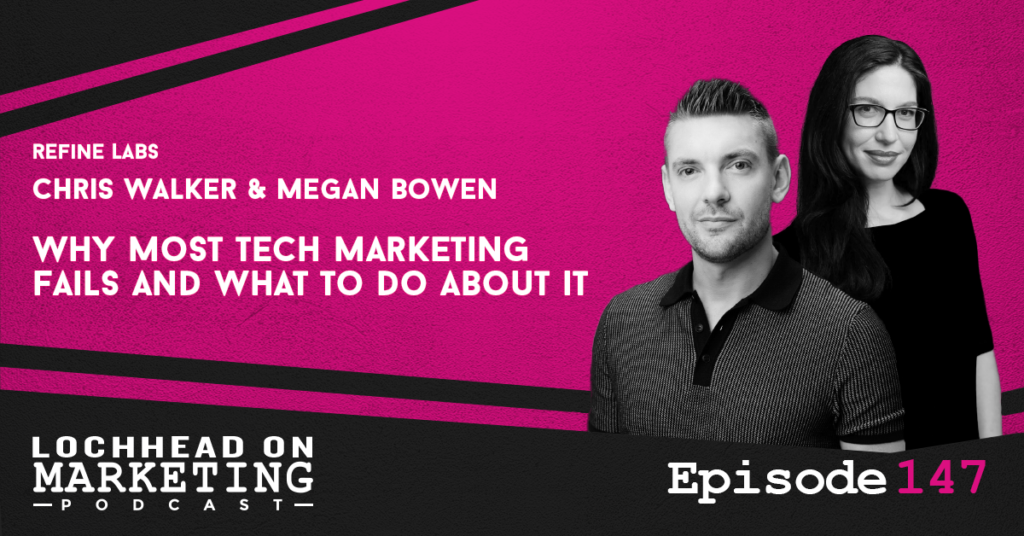
Podcast (lochheadonmarketing): Play in new window | Download (Duration: 1:18:39 — 54.0MB) | Embed
Subscribe: Apple Podcasts | Spotify | RSS | More
As you all know, normally there aren’t any guests for Lochhead on Marketing. But today, we have a special episode for tech entrepreneurs and marketers, as we have a dialogue with Megan Bowen and Chris Walker of Refine Labs.
Megan Bowen and Chris Walker are the COO and CEO of Refine Labs. They also have an amazing podcast, called The State of Demand Gen podcast.
As there have been a lot of bad thinking in marketing, a lot of which stems from old thinking. Chris and Megan have been doing a lot in helping drive the conversation onto new grounds, and making tech companies become in demand again. So if you’d like to hear their thoughts on the matter, stay tuned.
Welcome to Lochhead on Marketing. The number one charting marketing podcast for marketers, category designers, and entrepreneurs with a different mind.
Contributing to the Marketing World
The conversation starts with lauding Megan and Chris on the wonderful work they are doing on their podcast, State of Demand Gen. Christopher himself has been a guest before; you can check the episode here. But while Refine Labs has been around for a while, there’s not really a lot of things that people know about Chris and Megan, and what they do.
Megan shares that her background has always been in customer success and company operations. For her, Chris is the true visionary and disruptor when it comes to marketing.
“What I think I really bring to the table is a different way to think about company building. And I’ve had a ton of fun becoming a marketer in how we think about acquiring great talent and positioning our company in the eyes of candidates.” – Megan Bowen
Chris adds that without Megan, it would’ve been hard to make his ideas become reality.
A Clear Shift in the Market
Chris comments that it has been obvious to him and the team that there has been a shift in how people in B2B actually want to buy things. But surprisingly, a lot of companies are not adjusting to that reality because they’re stuck in the old ways of marketing.
“That shift sort of goes in line with what some of those topics that you talked about, Christopher. Native Digitals and Native Analogs is one piece of it. So how do people primarily want to engage research, discover, evaluate their suppliers and decisions and make decisions? How do they want to do that? As we start moving into the workforce, there’s more, I think you’ve mentioned, a stat of like, at least 50% of actual decision makers in a B2B buying process are now Native Digitals.” – Chris Walker
With this shift comes a lot of new opportunities and approaches to try out. So the slow adjustment of most companies nowadays to adapt to such things is what gives companies like Refine Labs to sort of “pop out of nowhere” and dominate the market.
On Native Digitals and Native Analogs
On the topic of Native Digitals and Native Analogs, it seems that S&P 500 CEOs, who are still majority Native Analogs, are not aware that the buying market is being overrun by Native Digitals. According to Chris, those who have noticed have started to create categories and marketing catering to that demographic. But for Chris, that isn’t nearly enough.
“I think that it’s important to look more holistically at the overall business. So some of the things that power our advantage. We think about our culture and our talent, talent, experience and talent management from a native digital lens. We think about building future products and experiences for customers through a native digital lens. And so when you look at the entire business, not just your marketing, there’s a lot of companies that can go out and put nice wallpaper on their marketing. Well, the foundations and stuff is cracking inside of the actual building.” – Chris Walker
Megan adds that it’s not only an approach that one should take in marketing, but in other aspects of the business as well.
“I think that a core component of any business, being successful and continuing to grow is attracting and retaining the right people to join their team and to continue to execute and innovate. And just like people are running old marketing plays and not catching up to what Native Digital’s need. Companies also have very antiquated ways that they think about retaining and attracting talent.” – Megan Bowen
To hear more from Megan Bowen and Chris Walker, and what you can do to avoid old marketing pitfalls, download and listen to this episode.
Bio
Megan Bowen
Megan Bowen has spent over a decade building and managing customer success and revenue generation teams for leading technology companies. She has worked with companies across the food, medical, and hospitality industries to create top-tier customer management functions, all focused on building long-term relationships and generating more revenue.
Megan currently leads marketing, sales, account management, client experience & operations teams at Managed by Q, the platform for office management. Her team is responsible for selling business-critical office services to new and existing clients, and providing workplace advice to thousands of companies with complex needs in the janitorial and maintenance spaces.
Prior to Q, Megan built the account management function for GrubHub/Seamless from scratch, and scaled the B2B client experience and account management structure for Seamless’ 5,000+ clients. Megan graduated from Adelphi University with a degree in Business Management.
Chris Walker
Chris Walker is the Founder and CEO of Refine Labs, a progressive demand generation firm that challenges the status quo in B2B marketing. Fueled by marketing execution at scale, Refine Labs uses real data from real customers to create demand strategy and research for their clients.
Before launching Refine Labs, Chris led marketing at two B2B firms where he built the foundation of his unique perspective on demand generation. Chris also hosts the State of Demand Gen podcast where he chats with today’s top B2B leaders to share tangible advice and tactics to over 15,000 marketers.
Chris Walker grew up in Boston, MA and graduated from Worcester Polytechnic Institute with a B.S. in Electrical & Computer Engineering and Biomedical Engineering. He started his professional career in the MedTech industry, migrating then into Product Management before making the move to marketing. Chris is also a serial entrepreneur, always finding ways to make an existing product or service better, or market a saturated product in different ways to break through the noise.
Links
Connect with Chris and Megan today!
Refine Labs | Chris’ LinkedIn | Megan’s LinkedIn | State of Demand Gen Podcast
We hope you enjoyed this episode of Lochhead on Marketing™! Christopher loves hearing from his listeners. Feel free to email him, connect on Facebook, Twitter, Instagram, and subscribe on iTunes!
271 David Gergen, Hearts Touched By Fire
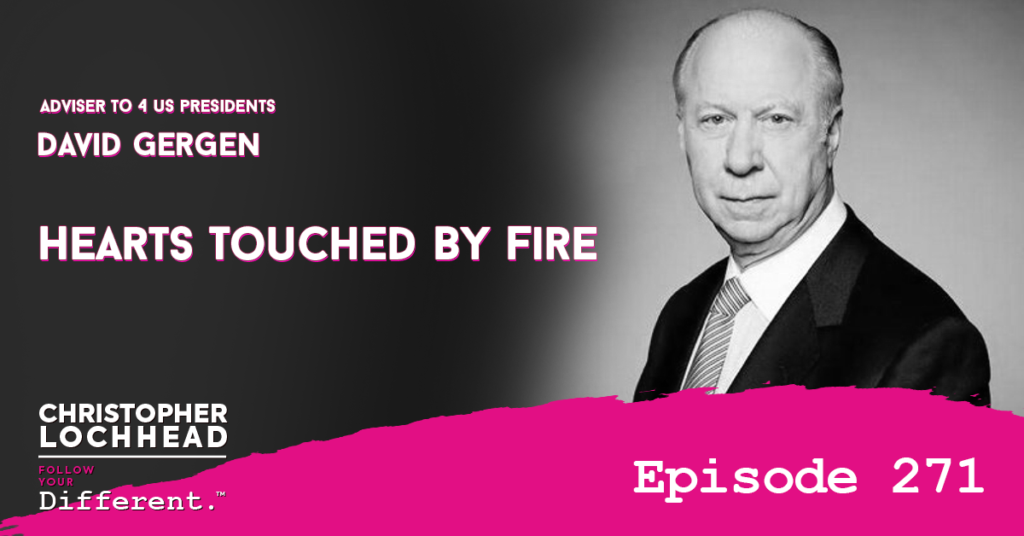
Podcast: Play in new window | Download (Duration: 1:07:31 — 46.4MB) | Embed
Subscribe: Apple Podcasts | Spotify | Pandora | RSS | More
Welcome to the second part of our extraordinary, unfiltered, unfettered real dialogue with David Gergen. On this episode of Christopher Lochhead: Follow Your Different, we dive into the key themes of his new book about leadership, called Hearts on Fire: How great leaders are made.
David Gergen has served as an adviser to four United States President Nixon, Ford, Reagan, and most recently, Clinton. He is the rare political leader to serve his country from both Republican and Democratic vantage points. Professor Gergen also teaches public service, and as the founding director of the Center for Public Leadership at the Harvard Kennedy School. He is also the winner of two Peabody awards for excellence in broadcasting.
If you want to check out the first part our dialogue with David Gergen, you can check out FYD episode 266, where he talked about his thoughts on the war in Ukraine, and the people with important roles to play in it.
David Gergen: Hearts on Fire
The conversation starts off on the topic of David’s new book, and how it is different from his previous work. His new book, Hearts on Fire, felt more like a love letter to the Native Digital generation, and encouraging them as they face the future ahead.
David explains that he felt as though people that are currently handling the reins are going in the wrong direction. But he could see potential in the new generation, and would like to share his knowledge to them and help them grow.
“There were a lot of individuals in my classroom. So I thought the world of them, and I thought they were really impressive. They have the capacity to change the world, or just manage to change this country. So this was a an attempt to call them, to summon who would like to get in the arena. I think they can make a huge difference.” – David Gergen
For David, his latest work was like a Legacy book; a message he wanted to leave for the next generation.
Turning Adversity into Purpose
A huge topic in this book is how to tackle adversity – not just to overcome it, but to use it to find your purpose.
David explains that a lot of the younger generations can do great things. But they are hampered by the fact that they have not figured out what their purpose is.
“We can draw hope from the quality of the people who are coming in these next generations. They’re just people who will knock your socks off when you spend time with them. But they’re still searching how they can make a difference.” – David Gergen
Like David said, he wanted his book to be a guide, or at the very least, share his own experiences so that the new generation can derive what they can do better in their life.
David Gergen on Passing the Baton
For David, writing this book was like passing the baton to the next generation. That said, he thinks that the older folks should be willing to do so, rather than clinging to power.
This also leads to the discussion about how leadership is evolving nowadays. We are no longer living in a world in which leaders are only formed in our nation’s most lead institutions. Rather, the current leaders of the generation come from the crowd themselves, like Greta, the Parkland students, and Malala.
To hear more from David Gergen and how the younger generation’s hearts of fire can help spark change in the world, download and listen to this episode.
Bio
David Gergen is a professor of public service and founding director of the Center for Public Leadership at the Harvard Kennedy School. In addition, he serves as a senior political analyst for CNN and works actively with a rising generation of new leaders.
In the past, he has served as a White House adviser to four U.S. presidents of both parties: Nixon, Ford, Reagan and Clinton. He wrote about those experiences in his New York Times best-seller, Eyewitness to Power: The Essence of Leadership, Nixon to Clinton (Simon & Schuster, 2001).
In the 1980s, he began a career in journalism. Starting with the MacNeil-Lehrer NewsHour in 1984, he has been a regular commentator on public affairs for some 30 years. Twice he has been a member of election coverage teams that won Peabody awards, and he has contributed to two Emmy award-winning political analysis teams.
In the late 1980s, he was chief editor of U.S. News & World Report, working with publisher Mort Zuckerman to achieve record gains in circulation and advertising.
Over the years, he has been active on many non-profit boards, serving in the past on the boards of both Yale and Duke Universities. Among his current boards are Teach for America, The Mission Continues, The Trilateral Commission, and Elon University’s School of Law.
David Gergen’s Work
David’s work as director of the Center for Public Leadership at the Kennedy School has enabled him to work closely with a rising generation of younger leaders, especially social entrepreneurs, military veterans and Young Global Leaders chosen by the World Economic Forum.
Through the generosity of outside donors, the Center helps to provide scholarships to over 100 students a year, preparing them to serve as leaders for the common good. The Center also promotes scholarship at the frontiers of leadership studies.
A native of North Carolina, David is a member of the D.C. Bar, a veteran of the U.S. Navy, a member of the Council on Foreign Relations and a member of the U.S. executive committee for the Trilateral Commission. He is an honors graduate of Yale and the Harvard Law School. He has been awarded 27 honorary degrees.
David has been married since 1967 to Anne Elizabeth Gergen of England, a family therapist. They have two children and five grand-children.
His son, Christopher is a social entrepreneur in North Carolina as well as an author and member of the Duke faculty. His daughter, Katherine is a family doctor, working with the underserved population at the Boston Medical Center.
Links
Connect with David Gergen
Website | Twitter | Harvard | CNN | WSB
Check out his new book: Hearts Touch with Fire
We hope you enjoyed this episode of Follow Your Different™! Christopher loves hearing from his listeners. Feel free to email him, connect on Facebook, Twitter, Instagram and subscribe on iTunes!
270 Free Speech with Jacob Mchangama, Author of “Free Speech: A History from Socrates to Social Media”
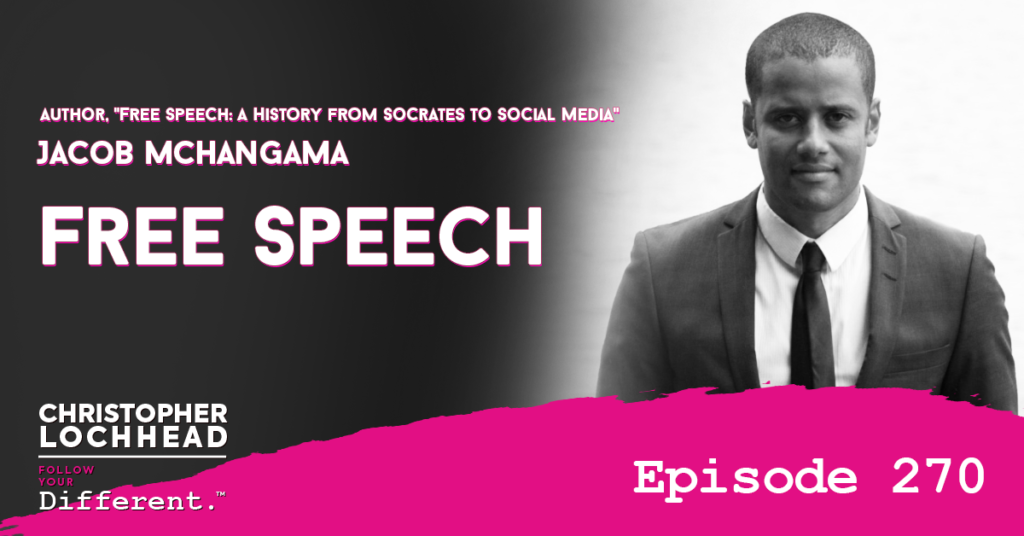
Podcast: Play in new window | Download (Duration: 1:25:40 — 58.8MB) | Embed
Subscribe: Apple Podcasts | Spotify | Pandora | RSS | More
Free speech is often called the first freedom and the bedrock of democracy. Our guest today says that on one hand, free speech around the world has never been better. But right now, we are experiencing a free speech entropy in the United States. On this episode of Christopher Lochhead, we have a deep dialogue about Free Speech with Jacob Mchangama.
Jacob Mchangama is a global expert on free speech. Political satirist PJ O’Rourke says that his new book is. “The best history of free speech ever written, and the best defense of free speech ever made.” That book is called Free Speech: a history from Socrates to social media, and it is out now. Jacob is a Danish lawyer, and the founder of Justicia, a Copenhagen-based think tank that focuses on human rights, freedom of speech, and the rule of law.
So if you want to learn more about free speech, how it has evolved through history, and what it will look like in the future, stay tuned to this episode.
Jacob Mchangama on Free Speech
The conversation begins on Jacob’s work on free speech, and his new book about it. He was then asked about what his thoughts on the current state of free speech in the world today.
According to Jacob, we’ve never had it better. It may not be as apparent in the US, but if you consider the rest of the world, people get to speak out more than ever before. Most of which was born with the proliferation of the internet, and the wide reach it provides.
“You and I can speak there’s no censor, making sure that we don’t say inappropriate things. And you know, so technology, internet has given us unprecedented opportunities.” – Jacob Mchangama
Recession of Free Speech
It is really the golden age of free speech. Though according to Jacob, it is an age that is currently in decline.
As things enter a more stable period after a boom of ideas, a state of entropy starts to set in. It is no different with free speech, as Jacob explains:
“Every time there’s a period in history where free speech is now sort of secure and we’ve turned the corner, a process of free speech entropy sets in. “ – Jacob Mchangama
This comes after the European Union is in the process of adopting a law which would, which says that social media companies have to remove your illegal content within a short timeframe or risk huge fines. Social media themselves are almost self-censoring to a point, restricting certain content from appearing on people’s search results and feeds.
The Evolution of Free Speech in the US
Moving the topic to the US side of things, Jacob finds the US and its take on free speech fascinating. According to him, it seems that free speech has evolved and grown over the years, and yet the first amendment and its wording has remained the same.
The evolution stems on how the US society interprets these words, leading to the growth of its scope and reach. As Jacob puts it, nowadays it’s difficult to imagine what you could say to a sitting US president that would get you in jail, short of direct threats or incitement of violence. Yet in the old days, you could go to jail for making a snide remark about an incumbent president.
But this same flexibility and reach is what’s putting free speech in a tight spot. With the wide reach of the internet also comes rampant misinformation. The issue is some of the people peddling misinformation is hiding behind the notion of free speech, which makes it difficult to remove once and for all.
Though for Jacob, it will all boil down to how we, as a society, will decide on what’s acceptable or not.
“Ultimately, I think that the culture of free speech is probably more important than the legal language, or a legal statute, or constitutional protection. Because ultimately, the culture of free speech is what will inform where we draw the limits, and how we interpret the legal protections that we have.” – Jacob Mchangama
To learn more about Jacob Mchangama and the current state of free speech in the US and around the world, download and listen to this episode.
Bio
Jacob Mchangama is the founder and executive director of Justitia and a visiting fellow at the Foundation for Individual Rights in Education in Washington. In 2018 he was a visiting scholar at Columbia’s Global Freedom of Expression Center.
He has commented extensively on free speech and human rights in outlets including the Washington Post, the Wall Street Journal, The Economist, Foreign Affairs and Foreign Policy. Jacob has published in academic and peer-reviewed journals, including Human Rights Quarterly, Policy Review, and Amnesty International’s Strategic Studies.
Jacob is the host and narrator of the podcast Clear and Present Danger: a history of free speech and the author of the critically acclaimed and award-winning book, MEN Ytringsfrihedens Historie i Danmark (BUT: The History of Freedom of Expression in Denmark).
He is the author and presenter of the short documentary Collision: Free speech and religion (2013). Jacob is a 2016 Marshall Memorial Fellow. He is the recipient of numerous awards for his work on free speech and human rights.
Links
Connect with Jacob Mchangama
Twitter | Wiki | Free Speech: a history from Socrates to social media
We hope you enjoyed this episode of Christopher Lochhead: Follow Your Different™! Christopher loves hearing from his listeners. Feel free to email him, connect on Facebook, Twitter, Instagram, and subscribe on Apple Podcast! You may also subscribe to his newsletter, The Difference, for some amazing content.

